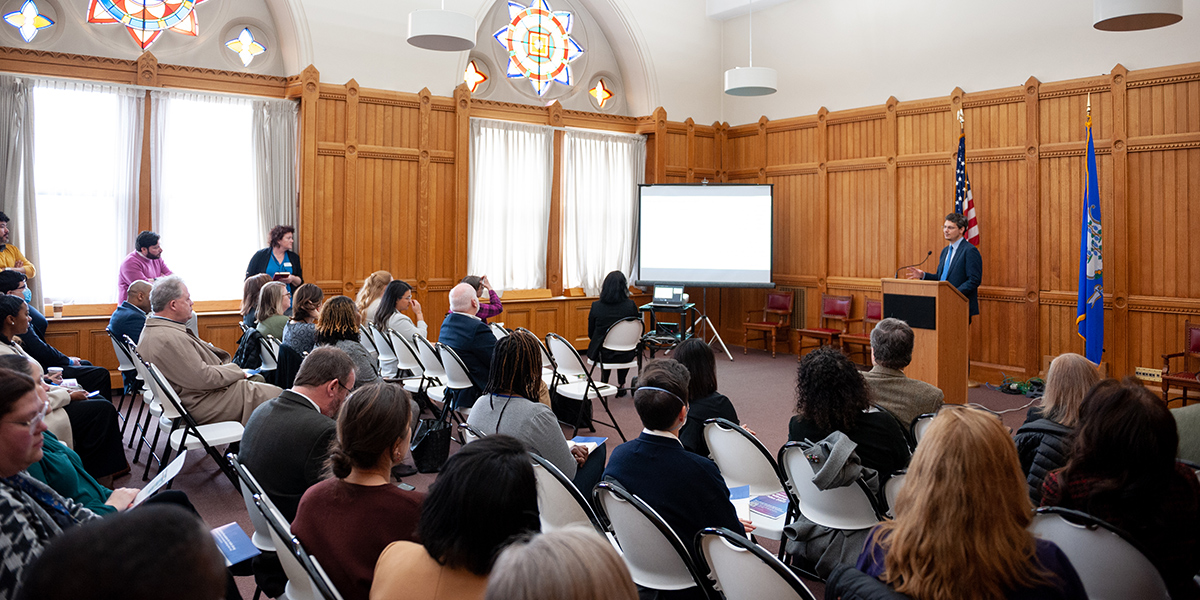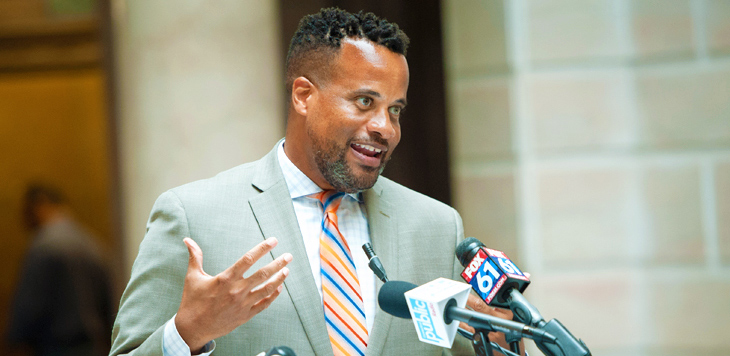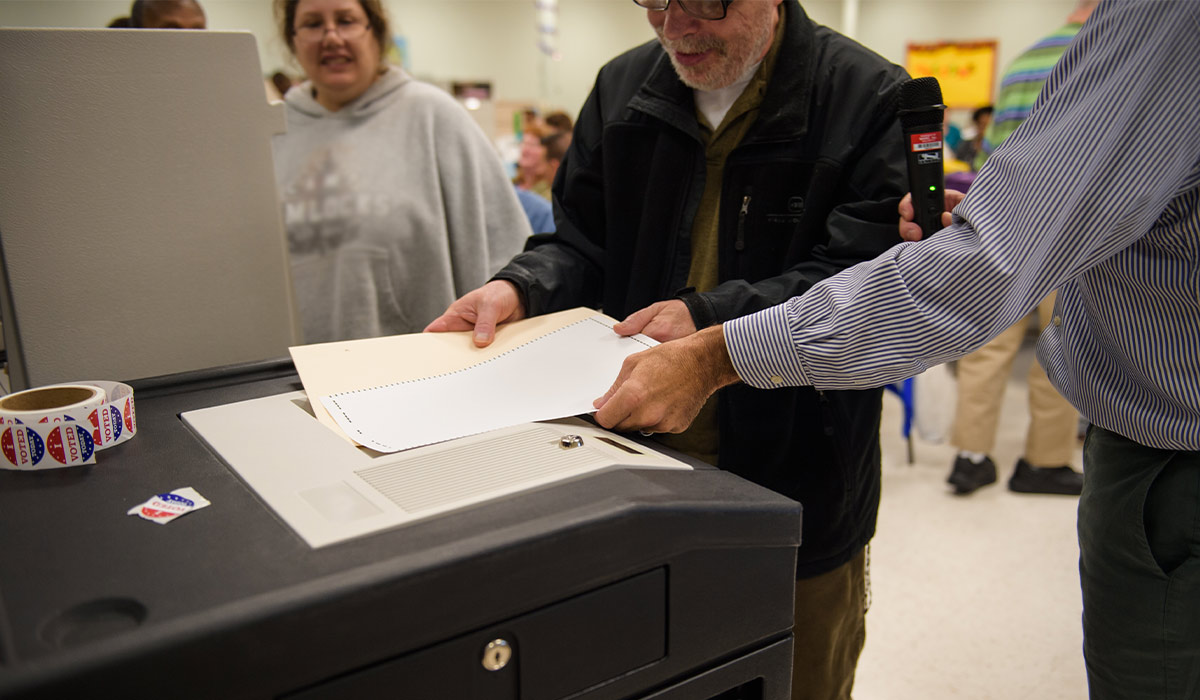Strategic Learning and Evaluation

Strategic Learning and Evaluation
The Hartford Foundation's Strategic Learning and Evaluation activities inform action on our Outcome Areas, so that we can achieve greater progress toward our efforts to dismantle structural racism and achieve equity in social and economic mobility in Greater Hartford's Black and Latine communities.
Our Goals
- Strengthen the regional data, research and evaluation ecosystem
- Improve the region’s actionable data that allows for disaggregation and analysis by geography, income and race and ethnicity
- Improve data sharing and integration in Hartford and our 29-town region
- Improve cultural responsiveness and equity in evaluation and learning practice
Our Outcome Areas: Sharing What We've Learned
We have identified five outcome areas for our work using research, evaluation and feedback from our partners. As our work in these areas progresses, we are committed to supporting, commissioning and contributing to evaluation and research projects and sharing what we learn with the community through various means, including this webpage.
Higher Opportunity Neighborhoods
The Hartford Foundation seeks to increase the number of Hartford residents living in higher opportunity neighborhoods.
Description: The purpose of this report is to describe neighborhood market conditions and trends in Hartford, to enable the city and other stakeholders to use this information as a critical tool to inform and develop equitable, efficient and effective strategies to address disinvestment and decline in neighborhoods and build stronger housing markets throughout the city. This report was prepared for the Hartford Land Bank by the Center for Community Progress, and funded by Hartford Foundation for Public Giving.
Year: 2019
View the Report: Hartford Land Bank: Assessment of Market Conditions and Trends in the City of Hartford
Description: This brief describes the issue of blight in Greater Hartford and some of the promising strategies that the Hartford Foundation and others have employed to address blight.
Year: 2018
View the Report: Blight Remediation Learning Brief
Description: This report, based on national best practices, recommends strategies to advance a transit oriented development vision along the CTFastTrak corridor and create an ongoing, mutually-beneficial partnership among anchor institutions, govenments and communities. The report was prepared for the Capitol Region Council of Governments (CRCOG) with financial support from the Hartford Foundation for Public Giving.
Year: 2016
View the Report: Building Corridors of Opportunity
Description: A study to identify companies in the region at all growth levels, including high-growth firms, companies experiencing slower sustained growth over time, and those firms not growing, but which may have the potential for growth in the future.
Year: 2015
View the report: Connecticut Knowledge Corridor Growth Business Study
Description: A feasibility study and implementation plan for housing rehabilitation initiative in Blue Hills, a neighborhood in the northwest section of Hartford. The purpose of this study is to determine if development opportunities are possible, practical and viable in the Blue Hills neighborhood.
Year: 2013
View the Report: Blue Hills Feasibility Study
Employment Opportunities
Our Foundation seeks to increase stable employment opportunities for adults and youth in our region facing barriers to employment.
Description: The Greater Hartford Reentry Welcome Center officially opened its doors on September 17, 2018. This is a series of reports for a three-year formative evaluation comprising process and outcome findings. Its purpose is to identify what is and what is not working well and to provide strategic recommendations for areas needing improvement and to leverage emergent promising practices. The reports were created for Community Partners in Action by Diamond Research Consulting, with funding from the Hartford Foundation for Public Giving.
Year: 2017-2022
View the Reports:
Greater Hartford Reentry Welcome Center: Year 3 Evaluation (Sept 2020 - Sept 2021)
Greater Hartford Reentry Welcome Center: Year 3 Evaluation Summary
Greater Hartford Reentry Welcome Center: Year 2 Evaluation (Sept 2019 - Sept 2020)
Greater Hartford Reentry Welcome Center: Year 1 Evaluation (Sept 2018 - Sept 2019)
Greater Hartford Reentry Welcome Center: Year 1 Evaluation Summary
Description: As open-access institutions, community colleges provide avenues to educational attainment and economic mobility for historically marginalized groups, but persistence and completion rates community colleges are low in real and relative terms. This is attributable both to factors within the institutions themselves and to contextual factors facing community college students. COVID-19 and its resulting economic consequences disproportionately hurt the populations served by community colleges, causing both enrollment and persistence to decline sharply since the beginning of the pandemic.
In this context, Hartford Foundation for Public Giving sought to make short-duration grants to community colleges and affiliated local organizations to address and support community college student retention during the 2020/21 academic year.
To understand the impact of these grants during the pandemic, the Foundation contracted an evaluation team from Trinity College. The aim of this evaluation is to provide insights as the Foundation hones its approach to postsecondary grant-making.
Year: 2022
View the Report:
Supporting College Student Success during COVID-19: Evaluation Report
Description: The structures and systems that create and exacerbate inequities in quality of life outcomes, are multifaceted, pervasive and deeply tethered to race. As part of our effort to address persistent disparities, structural racism and disinvestment, the Hartford Foundation commissioned an assessment of needs and supports for women and people of color, to address questions such as:
- Which financial and other types of resources do women and people of color access when starting or growing their businesses?
- What are the barriers and gaps in resources/services that hinder women and people of color from starting or growing their businesses?
- What are the potential sources of capital in the Greater Hartford region for women and people of color?
- What are the barriers to accessing these potential sources of capital in the Greater Hartford?
Year: 2021
View the Report:
Description: In January 2016, the Hartford Foundation launched the Career Pathways Initiative to increase the employment of residents of the Greater Hartford region with limited literacy and job skills who historically lacked access to career services and opportunities for advancement. In particular, the Foundation sought to steer these residents into the region’s middleskill jobs – those requiring education and training beyond high school but less than a four-year college degree – that consistently went unfilled because of a shortage of qualified candidates. Below are links to emerging findings from the first two years, as well as a final evaluation report.
Year: 2016-2020
View the Reports:
Career Pathways Initiative: Evaluation Brief
Year 1: Emerging Evaluation Findings
Year 2: Emerging Evaluation Findings
Evaluation of the Career Pathways Initiative: Final Report (2020)
Evaluation of the Career Pathways Initiative: Final Report Executive Summary (2020)
Description: The Hartford Foundation for Public Giving commissioned researchers at Trinity College to review the existing scholarly and field-based literature on the themes of college scholarships and postsecondary student success. The research team sought to answer three primary questions:
- How can Foundation scholarships be designed to increase access, persistence and completion in college?
- What supports can be tied to scholarships to increase access, persistence and completion?
- How can Foundation scholarships best help students from underrepresented backgrounds access, persist in and complete college?
Year: 2019
View the Report:
Scholarships, Supports, and Student Success: A Review of the Literature
Scholarships, Supports, and Student Success: Executive Summary
Description: Hartford Community Schools comprise a cohort of seven schools located throughout the city of Hartford. Since 2009, the schools’ transformation has been the shared undertaking of the Hartford Partnership for Student Success to improve student outcomes in select schools. Community Schools receive annual comprehensive evaluations, posted below. The 10-Year Retrospective Study examines outcomes in the seven schools from the 2009–2010 to 2018–2019 school years.
Year: 2009-2019
View the Report:
Hartford Community Schools: A 10-Year Retrospective Study
Retrospective Study: Info Sheet
Description: This Learning Brief explains why college scholarships are important and what strategies can be used to ensure college access. It also lists some of the investments that the Hartford Foundation has made.
Year: 2018
View the Report: Scholarships and College Access: Learning Brief
Description: The Foundation's education team worked with consultants from the Center for Policy and Assessment Development to develop outcomes to monitor and report on progress. This evaluation focused on better understanding whether the approaches the Foundation is using are effective in helping our community partners ensure positive outcomes for our region's children and families.
Year: 2017
View the Report:
Description: Research on ‘Project Choice,’ an integral part of the State of Connecticut’s response to the 1996 Sheff v. O’Neill school decision.
Year: 2007
View the Report: Improving and Expanding Hartford's Project Choice Program
Basic Human Needs
Our Foundation supports basic human needs in our region, applying an equity lens to the systems and programs that address food and housing, physical and mental health and the digital divide.
Description: The Hartford Foundation generated a summary of its Basic Human Needs (BHN) Emergency Assistance 2022 final grant reporting. This document includes learnings from 2022 BHN grantees' reporting, as well as regional data related to food insecurity and housing instability.
Year: 2022
View the report: Basic Human Needs Emergency Assistance grant reporting summary
Description: In April 2020, the Hartford Foundation contracted with the Collaborative for Educational Services to conduct a research review in support of its efforts to combat chronic school absenteeism in the Greater Hartford area. This report shares some of the findings, including key factors that keep young people out of school, examples of successful interventions, how grantmaking can support educational engagement and more.
Year: 2020
View the Report: Chronic Absenteeism: A Research Review
Description: Connecticut has the 5th highest rate of opioid-related emergency department visits in the country. This Learning Brief offers a snapshot of the region and best practices that could help address the issue.
Year: 2018
View the Report: Opioid Abuse and Mental Health Learning Brief
Description: On September 20, 2017, Hurricane Maria struck Puerto Rico as a category 4 cyclone. The devastation caused by the hurricane, and the insufficient response from government authorities resulted in, among other things, a massive out flow of residents to destinations in the United States, including Connecticut. The Hartford Foundation for Public Giving supported a survey through the University of Connecticut’s El Instituto: Institute for Latina/o Caribbean and Latin American Studies and the Center for Puerto Rican Studies at Hunter College to better understand the long-term impact of displacement on the Greater Hartford region. By sponsoring this survey, the Hartford Foundation contributed to fill the void in information, and in doing so, allowed for the planning and the contingency preparations of local nonprofit organizations, municipalities and schools.
Year: 2018
View the Report:
Storm Surge: Report on Impact of Post-Maria Displacements on Greater Hartford
Arts and Culture
Our Foundation seeks to support arts and culture in our region, with a focus on expanding opportunities for people of color, who are underrepresented in Greater Hartford's art workforce.
Description: This comprehensive study conducted by TDC and DataArts sought to identify key challenges and opportunities for Greater Hartford arts and cultural organizations. It provides demographic and funding data on arts and cultural organizations in the Hartford region. This effort also included a workforce survey of local organizations in the field. Both the Hartford Foundation and the Connecticut Office of the Arts will use the results of this study to inform additional grant making and support strategies.
Year: 2019
View the Report: Greater Hartford Arts Landscape Study
Civic and Resident Engagement
Our Foundation supports civic and resident engagement in our region by resourcing resident-led advocacy and organizing efforts and inclusive civic processes.
Description: The Greater Together Community Funds were created to support the community in taking ownership around the needs in their town, encourage broad and inclusive civic engagement and anchor the Hartford Foundation in each of the 29 towns in our service region.
The Community Funds evaluation will inform the ongoing implementation and development of the Funds and assess the extent to which the Funds have fulfilled their purpose. This report addresses topics such as how to identify need in a community, establishing inclusive grantmaking policies, building shared power between funder and residents, and more.
Year: 2021
View the Report:
Greater Together Community Funds: Year Two Summary Report (Dec. 2021)
Greater Together Community Funds: Year Two Summary Report, Executive Summary (Dec. 2021)
Greater Together Community Funds: Year One Summary Report (Oct. 2020)
Description: The DataHaven Community Wellbeing Survey, believed to be the largest of its type in the United States, produces reliable data about life satisfaction, physical and mental health, neighborhood conditions, economic opportunity and civic engagement at the local level. The survey collects and analyzes national, state and local data, supplemented by interviews with tens of thousands of randomly-selected adults statewide, including representative adults in the Greater Hartford area. The Greater Hartford Community Wellbeing Index includes information from the survey and insights into the wellbeing of residents in our community.
Results from the 2015 and 2018 surveys can be found here.
The Greater Hartford Community Wellbeing Index 2019 report can be found here.
A 2023 Equity Profile designed specifically for the Hartford Foundation and our service region, based on data from the Community Wellbeing Index, can be found here.
Year: 2023
View the Report: Greater Hartford Community Wellbeing Index 2023

COMMUNITY LEADERSHIP
The Foundation has chosen to take a greater leadership role in our community and use all possible tools at our disposal to help spread understanding and support marginalized sommunities. .
Released in July 2024, this report highlights opportunities and challenges for Greater Hartford’s LGBTQIA+ community.

More Evaluations and other learning projects
In addition to our outcome areas, we support, commission and conduct research and evaluations on a number of other topics relevant to Greater Hartford.
American Rescue Plan Act of 2021
Description: The Hartford Foundation for Public Giving (HFPG) engaged The Philanthropic Initiative (TPI) and Intersect Public Solutions (IPS) to:
1. Review planned ARPA funding at the Connecticut state, municipal and school district levels to inform the HFPG’s strategy and desire to leverage the positive impact of ARPA funding
2. Learn how other community foundations are examining ARPA funds coming to their regions, how they are responding, and how they might adjust grantmaking over the next few years while ARPA funds are disbursed.
Year: 2021
View the Executive Summary: Analysis of the American Rescue Plan Act of 2021 (ARPA): Executive Summary
View the Summary of Findings: Analysis of the American Rescue Plan Act of 2021 (ARPA): Summary of Findings
Early Childhood
Description: In December 2017, the Hartford Foundation awarded two-year grants to five agencies to participate in a Capital Region Early Childhood Collaboratives Network created to improve the school readiness and school success of young children birth to eight. The Network is intended to develop a regional early childhood blueprint, outline a plan of action for stakeholders, policymakers, and advocates, share in data collection and analysis activities, and increase the connection between the Network and CT Office of Early Childhood.
This evaluation focuses on articulating realistic collective and individual outcomes in Network- and collaborative-level theories of change, assessing the strength of the Network and progress toward its goals, assessing how participation in the Network benefits the local work of collaboratives, and capturing best practices and approaches in this effort.
Year: 2019
View the Report:
Capital Region Early Childhood Collaboratives Network: Year 1 Progress Report Presentation
Description: This brief describes some of the effects of early childhood trauma and offers some promising strategies that the Hartford Foundation and others have employed to address early childhood trauma.
Year: 2018
View the Report: Early Childhood Trauma Learning Brief 2018
Description: The earliest years of a child’s life are a crucial time for cognitive and social emotional development. The purpose of this report is to understand one substantial piece of the child care landscape: home-based providers in Greater Hartford.
- In the greater Hartford region, how many licensed family child care providers exist and whom do they serve?
- In the greater Hartford region, how many licensed family child care providers are receiving Care4Kids and who are the families receiving these subsidies?
- What are the technical needs of family child care providers?
- In the greater Hartford region, how many kith and kin providers are receiving Care4Kids subsidies and who are the families they serve?
Year: 2014
View the Report: Home Based Child Care Providers in Greater Hartford
Nonprofits and Capacity Building
Description: In May and June of 2017, The Center for Effective Philanthropy conducted a survey of the Harford Foundation for Public Giving grantees, achieving a 68 percent response rate. The memo below outlines the key findings and recommendations from the Foundation’s Grantee Perception Report. The report contains benchmarking data to allow readers to interpret perceptions in light of the Foundation’s goals, strategy and context.
Year: 2017
View the Report:
Grantee Perception Report: Full Report
Description: The Hartford Foundation’s General Operating Support grants help nonprofits enhance their infrastructure, respond to the needs of the community, take greater risks and create more innovative programming. In 2013, the Foundation began awarding General Operating Support Grants in response to grantees' expressed need. This series of evaluations assesses the implement of these grants and makes recommendations for the future.
Year: 2014-2017
View the Report:
General Operating Support Evaluation Report: Executive Summary
Phase I Evaluation Report: Introduction of General Operating Support Grants, 2014
Phase II Evaluation Report: General Operating Support Grants, 2016
Description: In 2016, the Hartford Foundation launched the Small Agency Program with multiple components: capacity building, grant support, and convening for capacity-building organizations and representatives from small agencies. The Foundation contracted with Cross Sector Consulting to evaluate the Small Agency Program, which focused on documenting and assessing program services, implementation accomplishments and challenges, early program outcomes, and lessons learned about supporting small agencies.
Year: 2016
View the Report:
Small Agency Program - Final Evaluation Report
Small Agency Program - Appendix A - Data Tables
Small Agency Program - Appendix B - Building on Success Products
Small Agency Program - Appendix C - Small Grants and Community Partners Products
Small Agency Program - Appendix D - Small Agency Program Participants
Description: Nonprofit agencies are essential partners in creating strong communities. The Hartford Foundation fosters organizational development by providing a range of capacity building services to more than 200 nonprofits in Greater Hartford through the Nonprofit Support Program. As part of its commitment to continuous learning and improvement, the Nonprofit Support Program undergoes regular independent evaluations.
Year: 2005-2016
View the Report:
Nonprofit Support Program Evaluation Brief
NSP 2016 evaluation (Diane Gordon)





